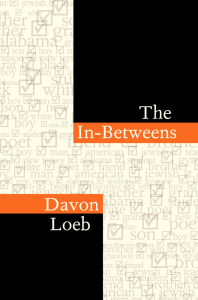
by Amy Lyons
Davon Loeb skillfully weaves together a series of non-fiction flash pieces to tell the story of his childhood and coming-of-age in The In-Betweens, published by Everytime Press in November, 2018. This lyrical narrative employs poetic language to describe everything from the deep and lasting ramifications of his parents’ separation and his struggles with his mixed-race identity, to ordinary days full of yard work and run-of-the-mill childhood roughhousing. It’s a book about growing up and out of boyhood amidst estrangement—from his birth father, from his brother, from his sense of identity—and becoming a man who sees shades of grey where others see only Black and White.
“Like Gladiators” is a piece that finds gorgeous music in bored children hanging around the neighborhood playing simple games: “And when tagging, we ran circles in the cul-de-sac, screaming and gasping, our feet hot and burning—the soles wearing, the bunny-ear laces flopping, and the Rorschach patterns of sweat on our shirts…And then the rusty coloring around knee-scrapes, and elbow-burns, and split lips, and what it was like, trying to wrestle down the sun.” It’s a delight to watch Loeb elevate child’s play to something grand.
It’s Loeb’s talent for lyricism and his gift for rendering a palpable sense of childhood wonder that powers the book. When the language flows full-throated and awe-struck toward a crescendo, the reading experience is one of total delight. In “Weekend Weather,” Loeb captures a child’s point of view on his parents fighting by comparing the scene to a storm: “Under the weight of the toppling sky and the volume of sharp rains, and the hard yells of my parents shaking the grout between the bricks of our home—on many of those nights I was dust clung to those shaking corners, while mom and dad push-pulled their iron bodies into each other.”
In “Quitting Meant Going Back to Babysitting,” Loeb describes getting a job with one of his friends as an exterminator. All of the teenagers in Loeb’s town are getting jobs, but Loeb’s mother wants him to stay home and babysit his brother. He chooses work over family, which seems like a memorable moment for the clear-eyed, retrospective narrator to look back on in light of some of the issues with which he struggles, namely guilt and choices around duty to family versus duty to one’s independence. But the experience leaves less of an emotional charge because it’s reported as a series of events rather than a pungent, searing memory with lingering and evolving meaning.
The book’s title serves as an effective evolving theme throughout. Loeb is “In Between” many forces throughout his childhood. Two of the most powerful are his fathers (one biological and largely distant, the other present as Loeb’s mother’s husband, but not a blood relative) and his two races: his mother is Black and his biological father is White. It’s quite moving to witness young Loeb struggle with his biracial identity and confusion in “Thoughts on Hair” and “But I am Not Toby,” the latter an extremely effective piece about the ridiculousness of cliched school lessons during Black History Month. When a teacher proclaims to the class that rap is not real music: “It was as if she was talking straight at me, channeling years of frustrations to the only Black student in class.” The sense of isolation that Loeb renders here is deeply moving.
When Loeb’s two fathers cut down a tree together in “Fighting for the Tree,” it seems the perfect, and perfectly rendered, illustration of a child’s sense of being trapped in the middle of two adults and not knowing which one to choose. One man cuts into the tree with a chainsaw, the other with an axe, and when the tree begins to sway, the boy and the fathers aren’t sure where it will fall: “Both men yelled different directions they thought he tree would go. It went one way and then the other, as if a table with one leg…Dad and my father, with one hand on the tree and other open, in my direction, both yelled—throw me the rope!”
The final “In-Between” of the book comes in the piece titled “In-Between Sirens,” a shorter, flash piece that takes its title from the pauses between a police car’s blue and red flashing sirens. It’s a compelling piece told with authority and authenticity, particularly when Loeb reveals that he knows he is being pulled over by the police because of the color of his skin: “He studied my license longer, and though I wanted to ask him what I did wrong—that I wasn’t swerving, that I didn’t run a stop sign, that I didn’t commit any traffic violations—I said nothing, and stood stone-till knowing it really didn’t matter—knowing exactly why he pulled me over—and that when he said there was a string of burglaries in the neighborhood and we looked suspicious, I wasn’t a bit surprised.”
______________________________
 Amy Lyons is an MFA candidate at the Bennington Writing Seminars. She has also studied writing at Squaw Valley Community of Writers, the Tin House Summer workshop, the Iowa Summer writing festival, and UCLA Extension, where she was nominated for a 2015 Kirkwood Literary Prize in fiction. She has been awarded a 2019 residency at Millay Colony for the Arts and a 2019 Mid-Atlantic Arts Foundation Creative Fellowship. Her journalistic writing has appeared in Lenny Letter, LA Weekly, Backstage, Pittsburgh Post-Gazette and more.
Amy Lyons is an MFA candidate at the Bennington Writing Seminars. She has also studied writing at Squaw Valley Community of Writers, the Tin House Summer workshop, the Iowa Summer writing festival, and UCLA Extension, where she was nominated for a 2015 Kirkwood Literary Prize in fiction. She has been awarded a 2019 residency at Millay Colony for the Arts and a 2019 Mid-Atlantic Arts Foundation Creative Fellowship. Her journalistic writing has appeared in Lenny Letter, LA Weekly, Backstage, Pittsburgh Post-Gazette and more.

